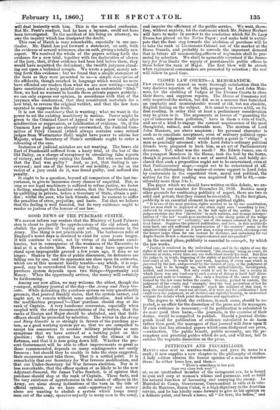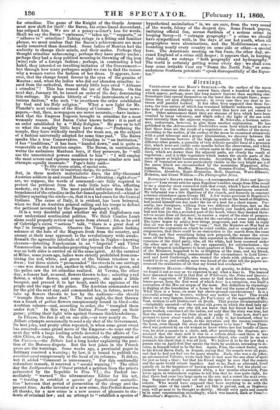PETTICOATS AND PECCADILLOES.
Maxus once sent us mantua-makers, and gave its name to a craft; it now supplies a new chapter to the philosophy of clothes. A lady seldom obtains the honest opinion of a man on feminine dress: he either loves her, and then- " There's something in her gait
Gars eny clues look weel " ;
or, as an unattached member of the antagonist sex, he is bound to quiz and carp at woman's whims and garments. and so fulfil his natural function of harassing and annoying the enemy.Le Marechal de Camp, Gouverneur, Commandant is vile et is oita- delle de Mantone, Baron Culoz, is a high dignitary in the Austrian service, and he has kindly come forward to give us his opinion on a delicate point, and a lance, all " for love, the ladies," and for crinoline. The game of the Knight of the Gentle Armour hypothetical assimilation" is, we are sure, from the very sound must now shift for itself : the Baron, his crino-lineal descendant, of hypothetical words, felony of the deepest dye. Some French papers, has eclipsed him. We are at a penny-a-liner's loss for words. imitating official fun, accuse Sardinia of a serious crime in Shall we say the Baron " embraces, " takes up," " supports," or keeping Savoy—it " outrages geography : " a crime we should " adheres to " crinoline ? Taking refuge in a fitting and familiar have sympathized with, in the days of our hot youth, when all phrase, we must confess that the Baron's achievements are more geographies were abominations, and the Mediterranean sea— easily conceived than described. Some ladies of Mantua had the bounding nearly every country on some side or other—a special audacity to change their minds, and their modes. Perhaps they bore. The Americans meeting on San Juan, the other day, ae- thought crinoline unbecoming; perhaps they have pretty andes ; cased England of a crime still deeper ; it appears that, in keeping
perhaps they had a deep political meaning in throwing off the. certainly iron that island, we outrage " both geography and hydrography." (wire) rule of a foreign fashion ; perhaps, in contracting a bad The world is rtainly getting worse every day : we shall soon habit, they intended an nsulting imitation of the Government— hear some irritable Czar cry "Damn the North Pole," or some but through how many perhapses might we run to find the reason audacious Southern potentate " speak disrespectfully of the Equa- why a woman varies the fashion of her dress. It appears, how- tor."
ever, that the change found favour in the eyes of the gamins of Mantua; and, when the ladies who did not abandon crinoline is- sued from the cathedral, these unruly little boys cried " Abbasso i crinolini" ! This has roused the ire of the Baron. On the next day, January 30, he issued an order of the day, denouncing this outrage. He speaks bitterly of " vile instruments of a no- torious faction," who seek "to overthrow the order established by God and his Holy religion." What a new light for Mr. Planche's next volume of the History of Costume ! Those news- papers,—but, then, newspapers are never accurate,—have insinu- ated that the Empress Eugenie brought in crinoline for a most womanly reason. But Baron Culoz knows better : it is part of an order established by a " Holy Religion." He goes on to tell us what the naughty little boys have done :—" Profaning the temple, they have wickedly insulted the weak sex, on the subject of a fashion universally adopted for some time past." The Baron speaks like a tree Conservative. Crinoline is " an institution," it has " traditions," it has been " handed down," and is quite as respectable as the Austrian empire. The Baron, in continuation, warns the audacious Mantuan boys, if they persevere he "will use the unrestricted rigorous confided to him" : " I ;ill employ the most severe and rigorous measures to repress similar acts and attempts equally insensate." Pope's fairy said- " To fifty chosen sylphs, of special note,
We trust th'important charge, the petticoat."
But, iu these modern materialistic days, the fifty-thousand Austrian soldiers in and round Mantua—" Attention ; right dress" are, we suppose, the words of command—are fully required to protect the petticoat from the rude little boys who, affecting modesty, cry it down. The most painful inference from this in- trenchment of the crinoline inthe far-famedqandrilateral—a kind of military squaring the circle—is, that it is a bad omen for the Central Italians. The cause of Italy, it is evident, has been betrayed, when we find an Austrian general calling out his troops to defend the petticoat invented by the Emperor Napoleon's wife. It is a very doubtful point whether we dull Englishmen can ever understand continental politics. We think Charles Lamb alone could properly review our news from abroad ; for, as he said of Coleridge 's extra " serious " talk, " there is a great deal of fun'. in foreign politics. Observe the Viennese police looking askance at the hats of the Magyars fresh from the country, and uneasy at their near approach to the revolutionary wide-awake. Remark the agreeable interlude of the police in Naples—knowing shavers—detecting Napoleonism in an " Imperial " and Victor Emmanuelism in moustaches projecting beyond the cheeks.. The war on both aides is carried on in the same spirit. At the carnival at Milau, some years ago, ladies were strictly prohibited from com- bining the red, white, and green of the Italian tricolour in a dress ; but three sisters " promenaded" the streets in one carriage —one was dressed in red, another in white, another in green, and the police saw the tri-crinoline realized. At Verona, the other day, a dancer had, as usual, flowers thrown to her ; selecting a red flower, a white flower, and some greenery, she made a little bouquet, and pressed it to her heart, amid the applause of the people and the rage of the police. The Austrian commander sent for the girl the next day, and commanded her, in future, never to take up flowers thrown to her by the audience—she should " trample them under foot." The next night, the first thrown was a bunch of yellow flowers conspicuously bound in black—the Austrian colours—and, according to order, she " trampled them under foot." In this way, the Italian Fronde carry on their game ; pitting their light wits against German thickheadedness. In France, the fun is all on one side,—or very nearly so. The Debate attempts occasionally to send a sly. shot at the Government. Its best joke, and pretty often repeated, is when some great event has occurred—some grand move of the Emperor—to come out the next day with a large leading article devoted to the affairs of Co- chin China, or Japan. On the last occasion,—the 'suppression of the Unirers,—the Debate had a long leader explaining the posi- tion of the Morocco dispute. But the best jokes in the French press are the warnings. Some weeks ago, a provincial paper in Brittany received a warning ; by law, it is bound to publish the avertissement conspicuously at the head of its columns. It did so, but it added "Comment is unnecessary." For this confessedly redundant remark, it received a " second warning ! " The other day the Independant de P Ouest printed a petition from the priests persecuted by the Republic to Pius VI. ; the Prefect im- mediately " warned" the ultramontane Editor for his act, as "- tending to establish a species of hypothetical assimila- tion" between that period of persecution of the clergy and the present time. As the inventor of a new crime, this Prefect deserves all thanks, for a new crime is a new source of pleasure to stu- dents of criminal law; and an attempt to "establish a species of
insulting "































 Previous page
Previous page